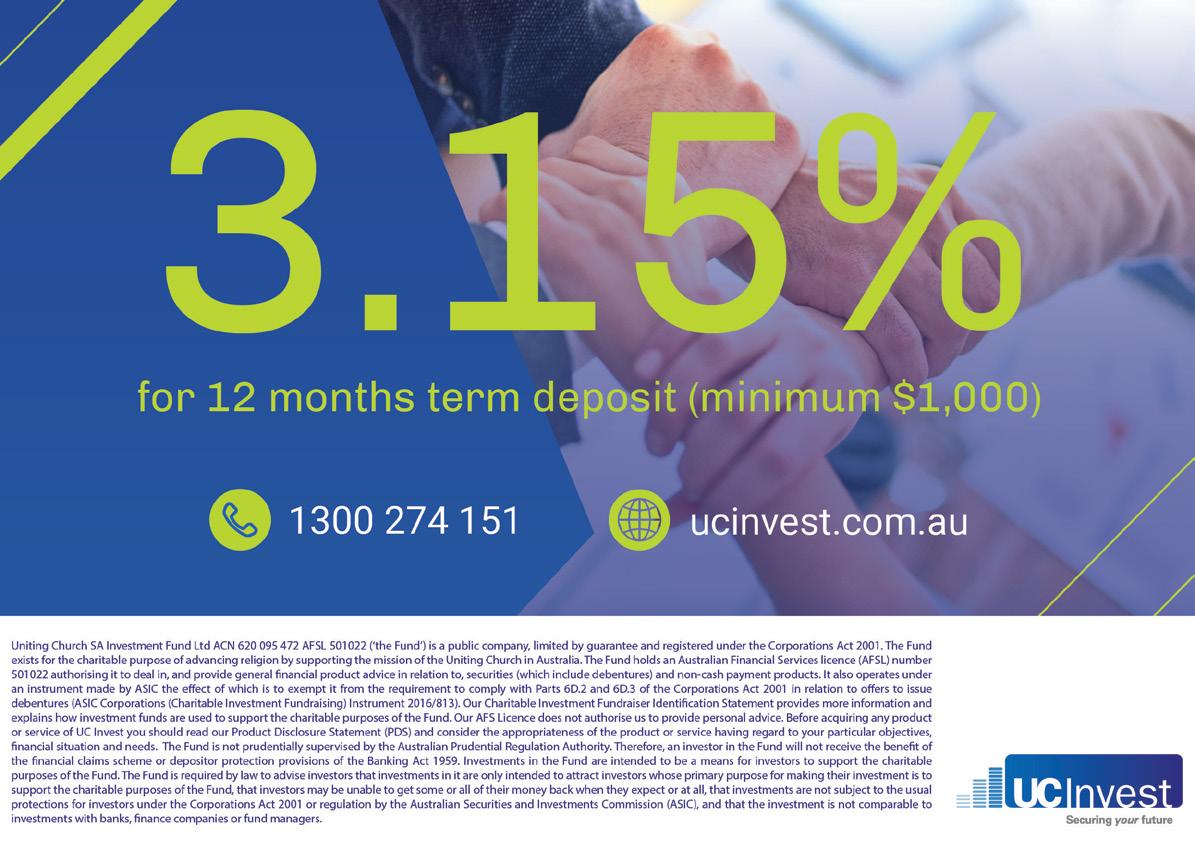Iksan City flag South Korea



Those We Pray For 4-5
International Mission - Memories of the Partnership 6-7 Partnerships Take Time 8-9
Where Do You Hear the Good News of Christ .......................... 10 International Partnership in the Philippines 11 Ahmad's Story 12-13 Meditation as Spiritual Care in a Time of Social Distancing 14 Easter 2023 15 ACT 2 16-17 Synod 2023 18-19
Regular pages
Note from the Editor 2 Message from the Moderator .......................................................... 3 Classifieds 20-23
Cover details:
Iksan City flag, South Korea. Photo by Bridget Ransome
The blue colour symbolises a gemstone; the Mireuksa temple pagoda is highlighted; and the mountains are a feature of Iksan City. The gemstone relates to one of the key industries of the city which is jewellery; the pagoda represents traditional culture; and the mountains symbolise a strong economy.
Editor: Bridget Ransome
Advertising: Engagement Team
Design: Alex Gatley
Print: Graphic Print Group Print circulation: 7,000
For editorial enquiries:
Phone: (08) 8236 4249
Email: engagement@sa.uca.org.au Mail: The Editor, New Times GPO Box 2145 Adelaide SA 5001
For advertising bookings: Phone: (08) 8236 4249 Email: engagement@sa.uca.org.au
Synod of South Australia
Level 2, 212 Pirie St, Adelaide
Phone: (08) 8236 4200 Fax: (08) 8236 4201 Country callers: 1300 766 956
Happy New Year and welcome to the first issue of New Times for 2023.
In the following pages you will see a theme which is focused on international mission. Deidre Palmer writes in her article Where do you hear the good news of Christ? That she hears this ‘expressed in many places, including in the mission we share with the global communion of churches.’
One such mission took place last November as a group from the Uniting Church in South Australia travelled to South Korea, to commemorate the 30-year anniversary of the partnership with the Presbytery of the Republic of Korea (PROK).
I was privileged and very grateful to be invited to travel with the group, and when we arrived in Korea, with a couple of days for orientation we then travelled to Iksan. We were met with great kindness and great generosity from our hosts. I noticed too, that longstanding friendships were re-ignited, especially poignant was Beverly Treadrea’s presentation during an Iksan Presbytery meeting, as she recalled memories of that very first gathering thirty years ago. Her article in this issue provides an historical insight to what is the longest standing international mission partnership of the Uniting Church in Australia.
I hope you enjoy reading about the purpose and intent of International Mission and its importance within the life of the Church.
I take this opportunity to also introduce two new staff members to the Engagement team within the Synod office. Azi Parvandar will commence on February 1st as a Graphic & Digital Designer, and we look forward to her bringing her design talents to the team. Lucy Wiseman will commence on 8th February as Events & Promotions Officer, and will initially work on the logistics for this year’s Synod meeting.
As your new year unfolds, I take this opportunity to wish you great blessings.
Bridget Ransome Executive Officer Engagement
Our Christmas celebrations are over and the New Year has begun. Some of us have started preparing for Easter and the remembering of Jesus’ life, death, resurrection and continuing presence with us. It is our faith and our special relationship with God through Christ that guides us in our living and our being.
As we joined together to celebrate Christmas, many of us have recognised our special connections with family and friends. Around our Christmas table there was much reminiscing of times gone by, from a number of different perspectives. There was fun and laughter, but also discussion and even disagreement as we shared significant points in our lives with each other. We realised we could not impose our own thoughts and expectations on each other, but needed to hold each other with respect and love. Sometimes when we see life from different perspectives, we more deeply value the relationships which hold us together, in love.
A recent trip to South Korea by members of Synod staff and others celebrated the long-standing relationship between the Uniting Church in South Australia and the Iksan Presbytery of the Presbyterian Church in the Republic of Korea. This is the longest standing international partnership of the Uniting Church in Australia. It is a partnership built on mutual respect and encouragement as we share our joys and challenges across distance and cultures. We continue to have much to learn from each other. This partnership, along with our formal partnership with the United Church of Christ in the Philippines and many other connections forged by local congregations, enable us as a church to work together, bringing different people together and sharing the good news of what God is doing in many places and we value these relationships.
Like our family around the Christmas Day table, we realise these relationships are healthy when we do not impose our own expectations, thoughts and culture upon others, but hold each other with respect and love, seeking to work together to share how God is at work and how we can make God’s world a better place. There are ample opportunities to share knowledge, talents, wisdom and faith with each other, both through visitation and other interactions.
Closer to home, there continue to be many opportunities to form connections with other congregations and organisations.

It is a joy to see co-operation and the sharing of resources in so many ways: the operation of the Emergency Relief Centres; the provision of preaching and crisis pastoral care to congregations without a Minister in Placement; the tremendous support of those in the middle of disaster areas. We are a generous church; willing to help those in need, no matter what their circumstances or beliefs. In this we are truly Disciples of Christ, caring for the sick and the needy, showing God’s love and compassion, and sharing our faith.
As we leave the Christmas and New Year holiday season and enter the time of Lent, I encourage you to consider anew how you can live out your faith, following Christ and deepening your connections with God, your church community and the wider world.
Bronte Wilson Moderator
... we realise these relationships are healthy when we do not impose our own expectations, thoughts and culture upon others, but hold each other with respect and love, seeking to work together to share how God is at work and how we can make God’s world a better place.
Uniting Church lives within a worldwide fellowship of Churches in which it
by contact with contemporary thought. Within that fellowship the Uniting Church also stands in relation to contemporary societies in which it will help it to understand its own nature and mission. The Uniting Church thanks God for the continuing witness and service of evangelist, of scholar, of prophet and of martyr. (Basis of Union para 11)
I have vivid memories of the emails we received in 1999 asking us to pray for the church in East Timor (as it was called then) as Indonesian troops responded to the independence movement. The emails later shared the dramatic story that the General Secretary of the East Timorese Protestant Church had refused the opportunity to leave by plane with other prominent leaders and instead had taken to the hills to care for congregations. Contact had been lost and there were concerns for his wellbeing. Over the ensuing months I wondered how this story ended but I noticed no new information. In 2000, at the Uniting Church Assembly in Adelaide, I engaged a man in conversation as we waited for a bus to take us to the meeting. To my surprise I discovered that this was the man for whom we had been praying. The late nineties and early noughties were a time of intense concern and prayer for Christians in Indonesia as they experienced violence from radical elements.
Those prayers, and the opportunity to meet those we pray for, brought home afresh to me the importance of engaging with

The
will learn to sharpen its understanding of the will and purpose of God
our partner churches. It is in a way a reminder of Paul’s concerns about us sharing in the sufferings of Christ (e.g. 2 Corinthians 1:5-7, Philippians 3:10). We share the concerns and struggles of our fellow Christians. We are invited to see the world through their eyes. This doesn’t mean that we will necessarily agree with them but at very least we will seek to understand them and their context.

The church in which I grew up had a foundation stone from an earlier building that spoke of the Primitive Methodist Connexion. Methodist denominations were fond of that word – connexion – always spelt with an ‘X.’ It was a reminder that central to their identity was their connection with other congregations and the wider church. This continues to be part of our identity as the Uniting Church too, although at times eroded by the growing ‘congregationalism’ experienced in the Western World. (Note I spelt congregationalism with a small ‘C,’ I am not casting aspersions on another group that came into union.) Again noting Paul, he works hard in his letters to connect congregations with
another through letters and fundraising. Just as there is no such thing as a solitary Christian in the New Testament, nor are there solitary congregations. It is part of Paul’s vision of Christ’s death and resurrection overcoming the walls that separate ethnic groups and social classes. It is further a fulfilment of the vision of earlier Hebrew prophets who saw the call of Abraham and the people of Israel being for the sake of the nations.
International Mission then is not simply us giving and serving other Christians overseas, it is central to our identity as communities of disciples of Jesus. It is part of who we are to be connected to Christians around the world, particularly communities in Asia and the Pacific. Moreover we are called to learn from those communities about their challenges and their contexts. The experience of continuing conversion that marks the life of discipleship is aided immensely by praying with, learning from and reflecting with our sisters and brothers in our partner churches. The same is true of course with First Peoples, but that is another article.
International Mission then is not simply us giving and serving other Christians overseas, it is central to our identity as communities of disciples of Jesus. It is part of who we are to be connected to Christians around the world, particularly communities in Asia and the Pacific.
It was in February 1992 that Rev Choi Hee Sup (Moderator of West Chunbuk Presbytery in South Korea) and Rev Sung Wha Park (Mission Officer at that time) signed an agreement with Rev Brian Ball of the Mount Lofty Presbytery who had chaired a group of interested members of the parishes with the purpose of partnership to develop closer relationships and to find effective ways of relating to partner churches.
So it was that on 3rd October 1992 a group from the Uniting Church in SA, led by Rev Ball arrived in Iri (now Iksan). We enjoyed a lovely buffet welcome lunch at Jaeil Church, and then the Adelaide group were taken to stay with host families for the weekend.
We met at Sung Kwang Church, Kunsan where we shared information about our different churches and after lunch at a local restaurant we all returned to the church for further discussion about the partnership and how we were going to progress our relationship. Members of the Presbytery of the Republic of Korea (PROK) asked if we could help to send an English speaking missionary to China; help young people to speak English; and that they were excited about making a return visit to Adelaide. Gifts were exchanged and a group photograph taken prior to an emotional farewell.
We followed up by hosting an excited group from West Chunbuk in Adelaide and initially they visited Nunyara. The first Korean group was mainly made up of men and during their visit they attended a number of church facilities including the Home for Incurables at Fullarton; Resthaven; and Congress at Port Augusta. The group were hosted in home stays and so were able to worship with local congregations during their stay.
The next group to visit Korea was led by Brian Headland and Myra Lillywhite. Whilst the second group from Korea arrived in Adelaide in September 1998 and this time some wives and three young single women attended.
The next group to visit Korea from South Australia was led by Rev Brian and Winsome Ball.

With the end of separate presbyteries in South Australia, the partnership changed and it became a partnership with Kunsan and Iksan (West Chunbuk had split into two presbyteries) and the Presbytery and Synod of South Australia.
In 2010 we again hosted a group from Korea in home stays and a Memorandum of Understanding (MOU) was signed at the Synod meeting at Adelaide West with the Presbyteries of Gunsan and Iksan and the Presbytery and Synod of South Australia.
In May 2012 the Adelaide group led by Christa Megaw and Adam Tretheway (Mission Officers from Synod) and the Moderator Rev Rob Williams travelled to Korea. During the trip there were visits to Doodong Church; Nabawi Catholic Church; a ceramic factory; Iksan Cultural Centre; and Bitnaeri Church. There was also a visit to the Iksan Senior Welfare Centre and the Dongn Church School for the Elderly. Coffee was enjoyed at Rev Moon’s wife’s coffee shop, and a visit to Shinkwang Church; the Jeonju Antiocha and The Paul Mission Church, Jeonju Hanok Village which included the restored Palace of the Choseon Dynasty and a Fan Museum.
There was also time to visit the Faith Church in Kunsan and the mountain area with Mount Mai, again to Jeonju before meeting home stay hosts. We worshiped with our hosts in their church and during a meal listened to speeches about the partnership which we all agreed was growing.
In 2014 a group arrived in Adelaide from Korea, mainly ministers and their wives. We used the two buses from Adelaide Korean Church and Heaven Springs Church and it was lovely to meet up again with Rev Ki Soo who was supply Minister at Adelaide Korean Church and had been our translator travelling with the group who visited Korea in 1992.
One of the highlights for this group was to visit the Bush Church in the Barossa Valley at Nuriootpa with Rev Rob Williams. We also worshipped at Heaven Springs Church.
In 2016 Rev Naomi Duke and Rev Sue Ellis (Moderator) led the South Australian group to Korea which included four young people and three Korean speaking ministers which made life very easy during the trip.

The visit included several churches, memorial and ancient sites, and National museums plus an extended stay in Jeonju. The current MOU was signed at the Iksan Presbytery Council after we had very happy discussions at Jeonju.

The last visit by PROK to Adelaide coincided with our Synod meeting and again visits to a variety of churches were organised. It was also a delight to welcome Rev Kim Eun Kyung (the first female Moderator).
Most visits to Korea have included the main office of PROK and we have always been greeted with special hospitality. We have also travelled to the Demilitarised Zone (DMZ) which has given us an insight into the great sorrow that our Korean friends endure and we pray with them for reconciliation.
Mention must be made of the wonderful hospitality that has occurred during all the visits and the dedication of many to the partnership. Home stays in both countries have been highlights and our thanks to the many hosts who have opened their homes and hearts to our visitors. Rev Lee Dae Hyun and Miss Myra Lillywhite were pivotal in maintaining the partnership between the two Presbyteries. In 2016 we sadly said goodbye to the Kunsan Presbytery. Many others have travelled several times on the biennial visits and many special friendships have been made.
We praise God who has led us and joined us as one.
Just like the woman at the well (John 4:1-4), partnerships take time. Time to sit and wait; time to share stories; time to reveal true dreams and desires; time for honesty and trust; and time for God to be at work.
Not everyone wants to wait. Some people, like the disciples, don’t want to put in the time, instead they are concerned with their own needs and desires. The demands of their churches and the comforts they have created for themselves. Distracted by the rumblings in their stomachs rather than the needs of others they would prefer to react to their own immediate needs and discover a quick way to feel good.
International partnerships are not about making ourselves feel good. They aren’t a quick fix to get the youth engaged in a project or a hope for baptism. They are no longer the fly in fly out, look what we did in my holiday adventure. They are a slow burn that requires thought, attention, community, sitting and reflection. Which means they are no longer a shiny fun thing that we can make about us. As a result we can be like the disciples, looking for a quick fix to meet our hunger and desires and miss out on what God is doing in our midst.
For more than thirty years the Uniting Church in South Australia and the Presbyterian Church of the Republic of Korea (PROK) have sat together. It doesn’t sound glamorous, or shiny and it isn’t. People might wonder why sit so long? Why haven’t you got something physical to prove the partnership is of worth? Why would we support sitting? Where is the project I can support? Anyone can sit.
It turns out not just anyone can sit because we don’t have a large support group willing to sit, listen, build community,
share ideas and opportunities and encourage the church in a community unlike our own.
At our recent Synod meeting we sang Aunty Denise’s song Yanakanai – it is a song welcoming people to gather together. What did that song mean to you? We sang a song of another community as though it was ours. If we don’t mean what we sing then it wasn’t about community. It could perhaps be thought of as cultural appropriation.
Again, like the disciples we could sit and wait or we could sing the song and then turn to our own needs and miss the opportunity for community. Our group sang (with permission) Yanakanai at the PROK Presbytery meeting in Iksan, South Korea last November. An invitation to come and gather. Not just the invitation to gather for business, but a heartfelt invitation to gather to hear stories of the past thirty years of churches making the courageous decision to sit.

Despite distance, cultural differences, language differences, and no buildings to paint or build, there was a mutual desire to learn as equal partners in a way that has not been done before. A thirty year partnership is unique in the Uniting Church.
As a partnership we know we are ageing and far from sexy. We also know that sitting together in partnership has opened our hearts and minds to understanding God’s mission in the world a little bit more.
We have experienced what it means to see God at work in ways different to what we would hope or want to experience at home. We have seen God who is not white, blue eyed and with blonde hair but sometimes might look strikingly Korean. We have experienced the generous hospitality of God through copious amounts of kimchi, Korean BBQ, bibimbap and rice. We have experienced the presence of God through prayers spoken in a language many of us don’t understand in words but feel in
our spirit. Like the woman at the well we have gone to the well thinking it was just another day and yet our lives have been changed as we gathered, sat, listened, prayed and shared.
Many years ago at Synod, we had a story teller join us to share the story of the stone soup. A story you might remember from childhood. A town that was once thriving had a well in the town square where people of all ages gathered, men and women connecting, as well as children who chased each other around the well. Then the town experienced drought and slowly people stopped meeting at the well. They stayed indoors, looking after their own needs rather than meeting at the well. Then a stranger came to town. He took a bucket of water from the well, made a fire and began to boil the water. Then he added two stones. From behind closed doors the people peered out to see what the stranger was doing. Eventually a courageous person stepped out to speak to the stranger to hear what he was doing. If you know the story, each person was asked to bring something to add to the water and eventually soup was made for everyone and as they brought what they had, they stayed around the well, talking and eating, sitting and listening and the children played.
Our Korean partnership is like the well. Once it was a central part of the life of the church but as our own needs have demanded more attention, we stopped meeting and even talking about ‘the well.’ It’s still there, even if you don’t meet there. Are you the courageous person willing to step out of your own comfort to see what is happening at the well?

We encourage you to bring what you have and to experience the well again. Drink and eat at the well. A place that invites you and welcomes you to experience community and God’s mission in the world.
Sitting might be like sitting on a zip line hundreds of metres above the ground peeking through tightly shut eyes, or it might be sitting in a bush chapel worshipping God. It might be sitting
around Korean BBQ communicating through broken sentences and made-up sign language or it might be sitting laughing in a lounge room after running through the rain to see the whales. It might be sitting, listening to the pain of a country ravaged by war and occupation of another country or sitting and hearing the pain of our Indigenous sisters and brothers. It might be sitting and hearing the passion of one group of people wanting to stand in unity with another group as they share their pain and struggles.
It takes courage and commitment to sit, to meet Jesus, to welcome the stranger, to just share what you have, but in doing so your relationship with God grows and you see God in ways you never expected.
Indigenous English Korean translation Yanakani come iriwahyo Wimilangha ikpala we will sit together hamgae anjoyo Arrawatanha most high chun Yang hamnida Ngarpalangha ikandha is present here Chunnim ee hamgai hamnida
It takes courage and commitment to sit, to meet Jesus, to welcome the stranger, to just share what you have, but in doing so your relationship with God grows and you see God in ways you never expected.
What are your news sources? Hopefully, one of them is New Times and UC e-News!

Over the years, I have tried to widen and diversify the sources I use for news of the world. In Australia we have limited news outlets; in most media there are biases.
As we enter into Lent and journey to Easter, we are reminded of the good news that is ours to celebrate and proclaim. Where do you see and hear this good news? From where do you source your stories?
I hear the good news of Christ expressed in many places, including in the mission we share with the global communion of churches.
As the Uniting Church in Australia, we hear and see the stories from many sources, including our twenty-three international partners, which our Uniting Church agency - Uniting World have worked with over this past year. (Refer their Annual Report.)
We are members of the Pacific Conference of Churches, the World Council of Churches, the World Methodist
Council, The World Communion of Reformed Churches and the Christian Conference of Asia.
During the crises precipitated by COVID-19 we have benefited from the insights of our global partners and their approaches to online worship and Communion, pastoral care and vaccination education.
Our understanding of climate justice and the health of our oceans has been deepened by the Pacific Conference of Churches with its focus on re-weaving the ecological map.
We have been inspired by the work of the Presbyterian Church of Vanuatu with their women’s leadership development and their focus on Christian education and discipleship.
The Asian Ecumenical Women’s Assembly, hosted by the Christian Conference of Asia, brought together women from across Asia, reminding us of our call to participate in ‘God’s mission of healing our wounded and broken world, and to be catalysts of reconciliation, renewal and restoration of creation.’
The Evangelical Christian Church in Tanah Papua has inspired and challenged us in their human rights advocacy and community development.
As we journey through Lent and anticipate the good news of the Risen Christ, I invite you to spend time exploring the stories from our global partners. I encourage you to discover sources of good news that will inspire you as you seek to deepen and broaden your journey with Christ, who sends us into the whole world, to be bearers of hope and love.
References:
Uniting World, https://unitingworld.org.au
Uniting Church in Australia Assembly, https://uniting.church
World Council of Churches, https://www.oikoumene.org
Deidre Palmer is ex-President, Uniting Church in Australia Assembly and Past Moderator, Uniting Church Synod of South Australia
The partnership between the United Church of Christ in the Philippines (UCCP) North Luzon and the Uniting Church in South Australia (UCSA) was originally signed in 1992 and renewed in 2007. This is a partnership of mutuality, advocacy, theological insights and friendship. Through partnership, the goal has been a mutual process of transformation across all areas of life (spiritually, socially and materially).
At the South Australian Presbytery/Synod meeting in November 2013, it was endorsed that the UCSA develop a new partnership with the UCCP - Middle Luzon Jurisdiction. This developed due to an invitation from the UCCP in 2010, when the North Luzon Jurisdiction was split up into two areas – North and Middle Luzon.
Some of the ways in which the hopes of our partnerships are enacted include:
• Praying for each other and for the peoples of the Philippines and Australia
• Sharing resources, information, liturgies and priorities
• Encouraging and facilitating exchange visits between our two churches in the form of exposure programs and study trips
• Focussing on theological partnerships through the mutual exchange and theological development of students and staff
• Addressing critical issues in both the Australia and Philippine context; particularly:

· The struggle for self-determination and land rights for our Indigenous and tribal communities

· To lobby our governments for the safety and security of UCCP members
· To encourage our church communities to develop awareness, and to live responsible lifestyles that do not contribute to the oppression of the suffering poor of the world nor increase the devastation of our natural environment.
Over the years, many Uniting Church Moderators and groups have visited the Philippines and been hosted by the UCCP –North Luzon. The most recent visit was in 2019 when a group of young people who were part of the Intern program at Uniting College, together with Rev Mark Schultz and Rev Mike Wardrop, visited our partner church and learned of the poverty, human rights abuses and environmental and mining challenges in the Philippines. They also mutually gained from faith, generosity
and friendship. The UCSA has also hosted a number of visits to South Australia by Bishops and others from our partner church in the Philippines.
In February 2021 as members of the Synod gathered we watched an appeal by Bishop Joseph of the UCCP – North Luzon. In his testimony, the Bishop spoke about on-going harassment of Christians in the Philippines. In May 2021, the Synod of South Australia received new pleas through the Synod of Victoria and Tasmania to support another UCCP Pastor who had been harassed and arrested. Uniting Church members were urged to join a letter writing campaign to support our partners within the UCCP.
My name is Ahmad and I am from a Middle Eastern country. My family was part of a minority group who had been living in that region for thousands of years, long before geographical borders were drawn between countries.
Like every other child, my life was just a game until I started school where I had to face the real environment I was living in. I had to speak a language at school which I had never learned and my attempts were laughed at by the teachers. We were treated like second class citizens, if not like foreigners.
My father was often taken away for interrogation by the authorities. We were accused of being spies with another country when this was not true. My father always believed in education and he thought that higher education was the key to success and happiness and we could achieve what we deserved, if we went to university. This is why five out of six siblings all graduated from university.
I worked very hard to prove myself despite the hardships and I became a teacher. This was a dream come true, but it did not last long. The authorities never trusted us and we were always watched. I became a target for the authorities and I lost my job. I found that education could not guarantee a safe life for me in my home country. Due to the suspicions about me, the rest of my family also lost their jobs.
When my life was in danger and nowhere was safe, I knew that my wife and I had to flee. The only option we had was to travel by plane and then boat to find a safe place. After a harrowing journey which took fifty hours on a small boat, we arrived at Christmas Island. Safety at last! Now we thought we could pursue our dreams in Australia and gain freedom and equality.
We spent 75 days in the detention centre before we were released on a bridging visa. We came to Adelaide and were glad to live in the community but were not allowed to work or have access to higher education. After six years we gained refugee status and were granted a Safe Haven Enterprise Visa. We still live in a desperate limbo as my wife and I and our two children are not allowed to apply for permanent residency in Australia.
I’m writing this in the hope of raising awareness about the plight of all refugees in Australia who are in a similar situation to us. It is now ten years since we landed in Australia. We are still waiting for access to higher education, equal job opportunities and health care and certainty for our future, like all other residents of Australia. We continue to live in a desperate state of limbo. Once refugees like us are truly welcomed and granted equality, we can flourish and release our full potential as we want to generously give back to our community here.
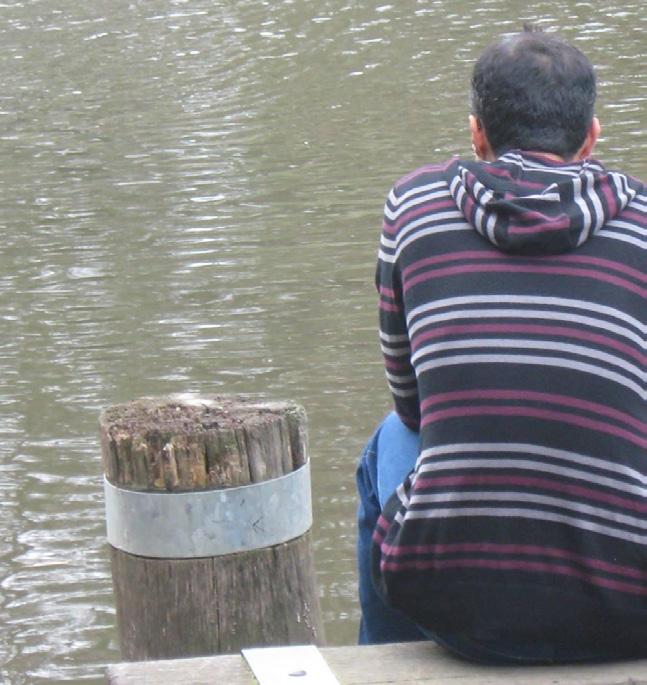
Once refugees like us are truly welcomed and granted equality, we can flourish and release our full potential as we want to generously give back to our community here.
I was hungry and you gave me food, I was thirsty and you gave me drink, I was a stranger and you welcomed me.'
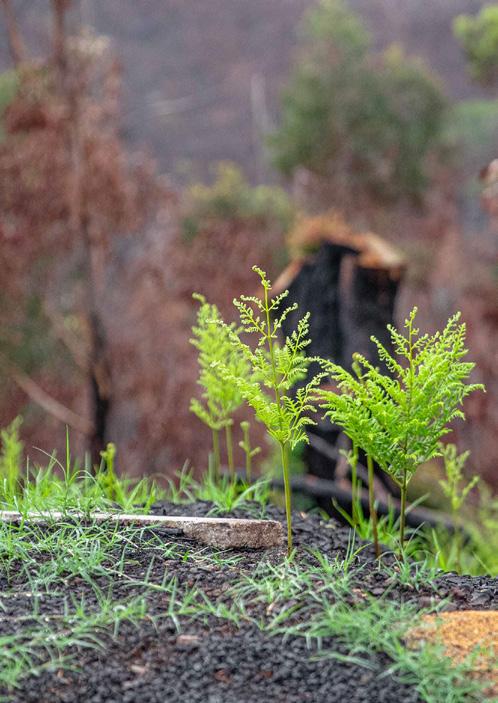
July 2021
The Synod of South Australia 2022 Synod resolution on Justice for Asylum Seekers and Refugees

Details available on the Synod of SA website at this link: https://sa.uca.org.au/justice-advocacy/refugees-and-asylum-seekers/
The Uniting Church in Australia document
This document is available at this link:
https://uniting.church/a-vision-for-a-just-australia/
‘A Vision for a Just Australia.’
...
Rev Nicholas Rundle has always been interested in mindfulness and meditation ever since he was a teenager, but he never realised a meditation program he developed for hospital staff would become utilised worldwide during a global pandemic.

Nicholas, who was ordained in the Anglican Church and is in placement as a Spiritual Care Chaplain at the Royal Adelaide Hospital, trained as a secular meditation teacher in 2006. He went on to lead retreats, teach meditation to people experiencing homelessness, and assist those in end of life care with meditation practices.
‘When I was a teenager I was very interested in alternate spiritualties - particularly in Buddhism – but then I became a Christian. So I left the Buddhism behind, but I became interested in Christian practices of contemplative prayer,’ said Nicholas.
Having worked as a chaplain in the Air Force for NATO during the Gulf War, the lockdowns and procedures to manage the COVID-19 outbreak, particularly in the hospital, made him reflect on his work during the conflict and what he could do to help patients and hospital staff.
‘One of the things I did [during the Gulf war] was visit the hostage’s families who were imprisoned by Saddam Hussein … so my work during COVID reminded me of that. The hospital was pretty much empty, everything was closed down,’ said Nicholas.
The Mindful Hand Care program was originally developed by Nicholas in 2018 as a collaborative project with a senior nurse who had attended one of his staff training sessions and had an idea to develop an exercise focused on the use of hand gel in infection control. The COVID-19 outbreak then became the catalyst for its widespread use.
prayer.
The meditation involves five steps – noticing your feelings, bringing your body upright, sighing, washing your hands, and then coming back to be present and re-check in on how you’re feeling.
The exercise became frequently used by both staff and patients at the Royal Adelaide Hospital during the pandemic, as well as by Methodist Homes United Kingdom, Adelaide Medical School and three National Health Service (NHS) trusts in the UK.
‘It’s not designed to help people put up with stress they shouldn’t be experiencing, sometimes when someone is stressed at work we think “oh let’s do some mindfulness” when you’re being put under pressure that nobody should be under. But meditation is there to help staff and patients retune, refocus and be present to themselves. I don’t think meditation is much different from prayer – it’s like a secular prayer,’ said Nicholas. Nicholas’s background in meditation has been a key part of his work as a Spiritual Care Chaplain, providing comfort, prayer and sometimes simply his presence to both Uniting Church patients and members of other faiths, as well as those who are not religious.
‘We’re not here to convert people, but to discuss what their spiritual needs are, to pray with people, to celebrate communion with them and also to support staff,’ said Nicholas.
meditation is there to help staff and patients retune, refocus and be present to themselves. I don’t think meditation is much different from prayer – it’s like a secular
As the Easter season approaches, a range of resources have been created to support congregations including:
Worship Guides for Good Friday and Easter Sunday
Worship at Home resources for Good Friday and Easter Sunday
Moderator’s video message
PowerPoint template
Social media graphics.
All resources are available from the Synod website at the following link: https://sa.uca.org.au/easter
Contributing writers: Rev Cheryl Wilson and Moderator Bronte Wilson.
Act2 is all about how we can work together as a whole Church to shape our life for the future, and everyone that calls the Uniting Church home is invited to participate.
The Act 2 Project Unit is committed to making meaningful opportunities available to engage, whether through online focus groups, face-to-face conversations, or by a conversation at the local level. You are invited to take up the opportunity that works best for you and your Church community in 2023.

Right now, any person, community, committee, council or other body within the Uniting Church can make a submission to the Project. In this way you can influence the Project as insights and ideas are gathered from across the Church. If you have something to say that the Church should hear, now is the time to act.
The Act2 Project recognises that our context is radically different from the time when many of our current structures and practices came into being. Society has changed and we have changed as a Church. Technology, patterns of work, age and cultural demographics, relationships to institutions, governance expectations, government policy and services amongst many other changes have all worked to confront our assumptions and patterns of church life. Throughout that same period, a lot of innovation and exploration has taken place in parts of our Church.
How can we adapt to these changes and harness new opportunities? What things are working and what needs to change? Please write in with your ideas.
You could also write in if you have passions or insights about one of the four key areas the Project is focussed on. These areas, called workstreams, are shaped by the decision of the Assembly. What are your responses to the four key questions?
Question: How can we do more to help and less to hinder life-giving communities of faith and discipleship?
How we order our life has a significant impact on the life and health of our local communities of faith and discipleship. In certain ways, our current structures and practices hinder us building life-giving communities of faith. We also know there are things we can do to help support and strengthen these communities. This workstream informs all the others. It is foundational to the Act2 Project.
Question: What is most valuable about being a national church and how do we resource it?
The Uniting Church is truly a national Church, working across the country in all sorts of diverse contexts. We also have a voice on issues of national significance grounded in who we are and the commitments we have made together over time.
Question: How do we order our life and distribute our resources to support our ministry and mission, particularly local communities of faith and discipleship?
We have governance structures and a resourcing model which has not adequately responded to our changing context. We want a model which is directed towards supporting effective ministry and mission and one that allocates resources based on need, responsibility and opportunity.
Question: How do we enable a sustainable set of institutions and practices that cultivate a vibrant theological culture?
Our theological culture is shaped by the institutions and practices of theological reflection and action. We want to explore the theological culture to which we aspire and how we shape institutions and practices that support that culture. We look for a culture which equips us all to be ministers of the gospel in whatever ministry and context we are called.
In this new year of 2023 there will be many opportunities to explore these questions and how we rethink and reshape our life to respond to them. In the first half of the year, there will be an exploration of ideas as to how we could shape our life differently. In the second half, we will be engaging in collective discernment, exploring specific directions and options to collectively strengthen our life as a Church.
Our work is shaped by prayer, and we will invite the whole Uniting Church to join us in prayer between Pentecost (28th May) and the Uniting Church Anniversary (22nd June) in 2023.
As we listen for the leading of the Holy Spirit, it may just be your voice that has the insight we need to find the direction God is calling us.
Article sourced from the Assembly website at this link: https://uniting.church/act2submissionsandworkstreams/ Further information and how to participate is also available at this link.
We look forward to:
• Installing Rev Peter Morel as Moderator on 21st June
• A Celebration of Ministry on 23rd June
• A visit from members of the Presbyterian Church of the Republic of Korea (PROK).
discern:
• First Peoples Voice to Parliament
• Synod Strategy and PlanningMission and Property working group report

• Call of a new General Secretary
• Membership of the 17th Assembly to be held in 2024
• Elections for Synod Standing Committee and other Synod boards and committees.
• If you’d like to become a member of the Synod, please contact your Presbytery
• Members of Synod may submit proposals for the meeting, only after consulting with the relevant board / council / committee whose ministry area the proposal fits within.
Location: Adelaide West Uniting Church and Yarthu Apinthi 312 Sir Donald Bradman Drive, Brooklyn Park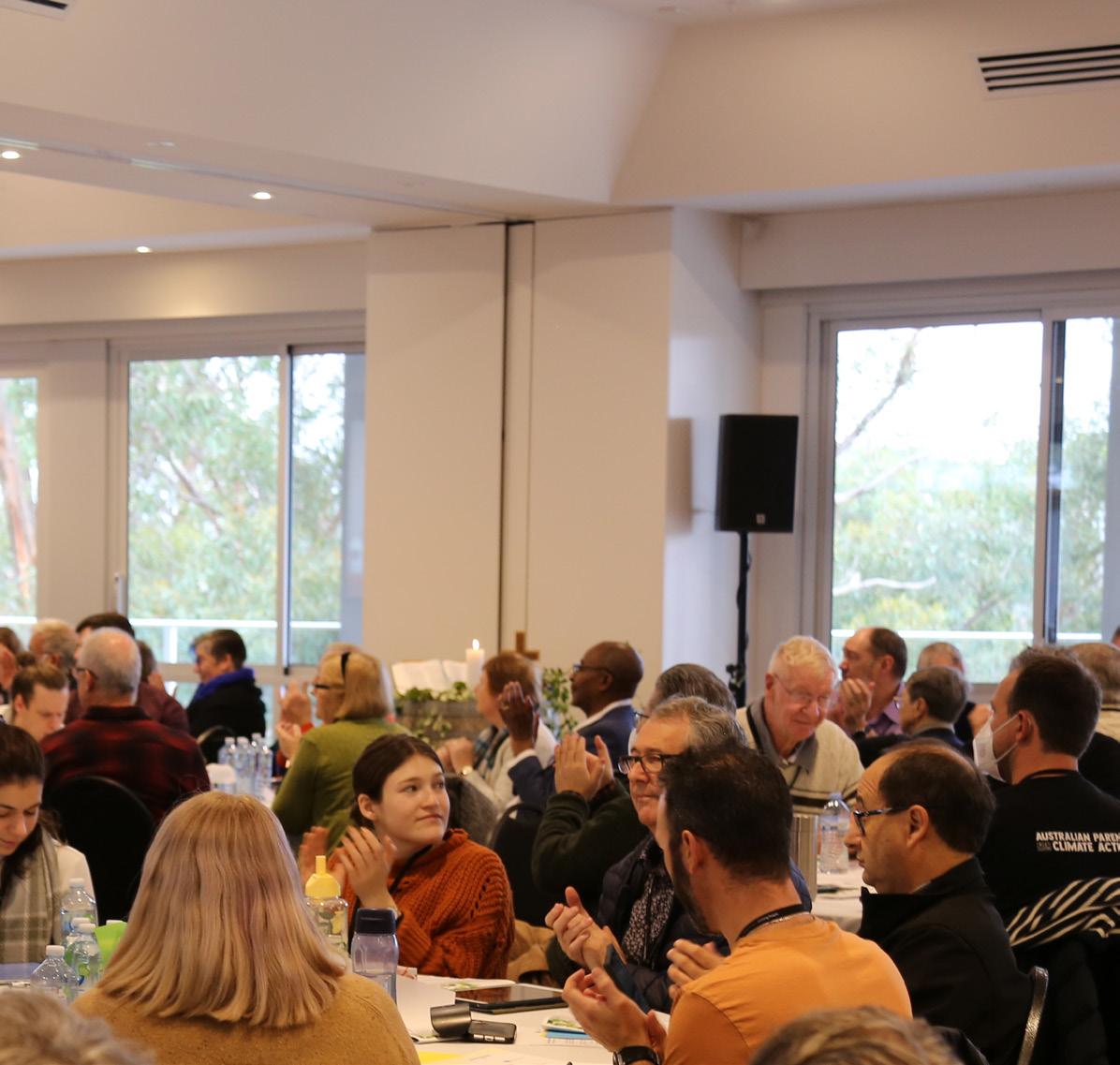
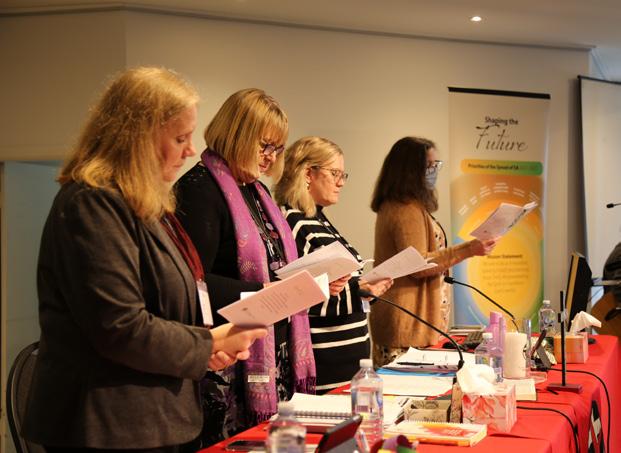
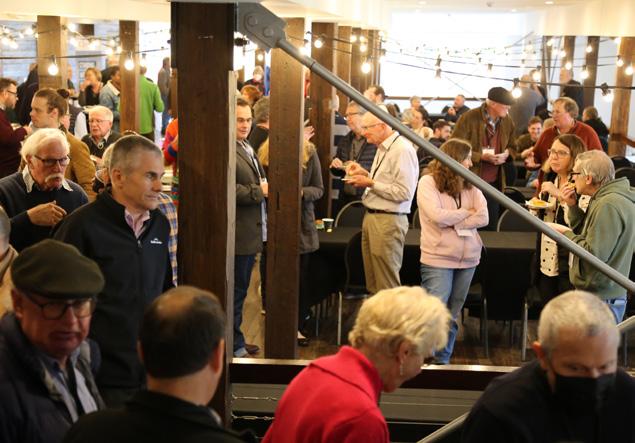

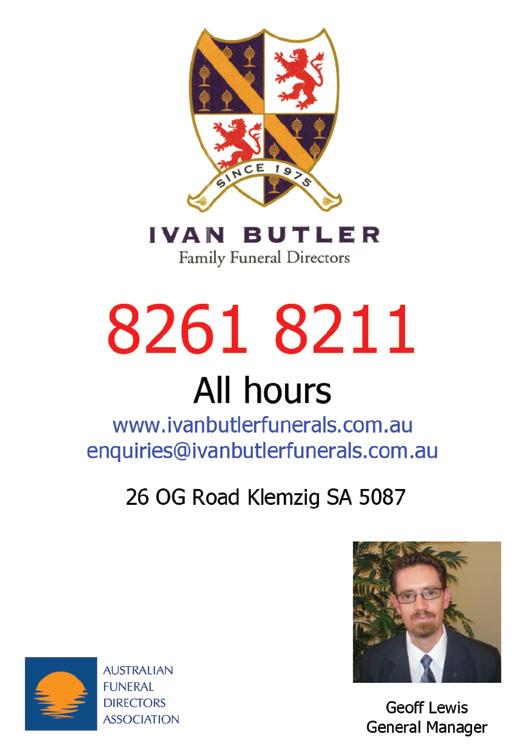

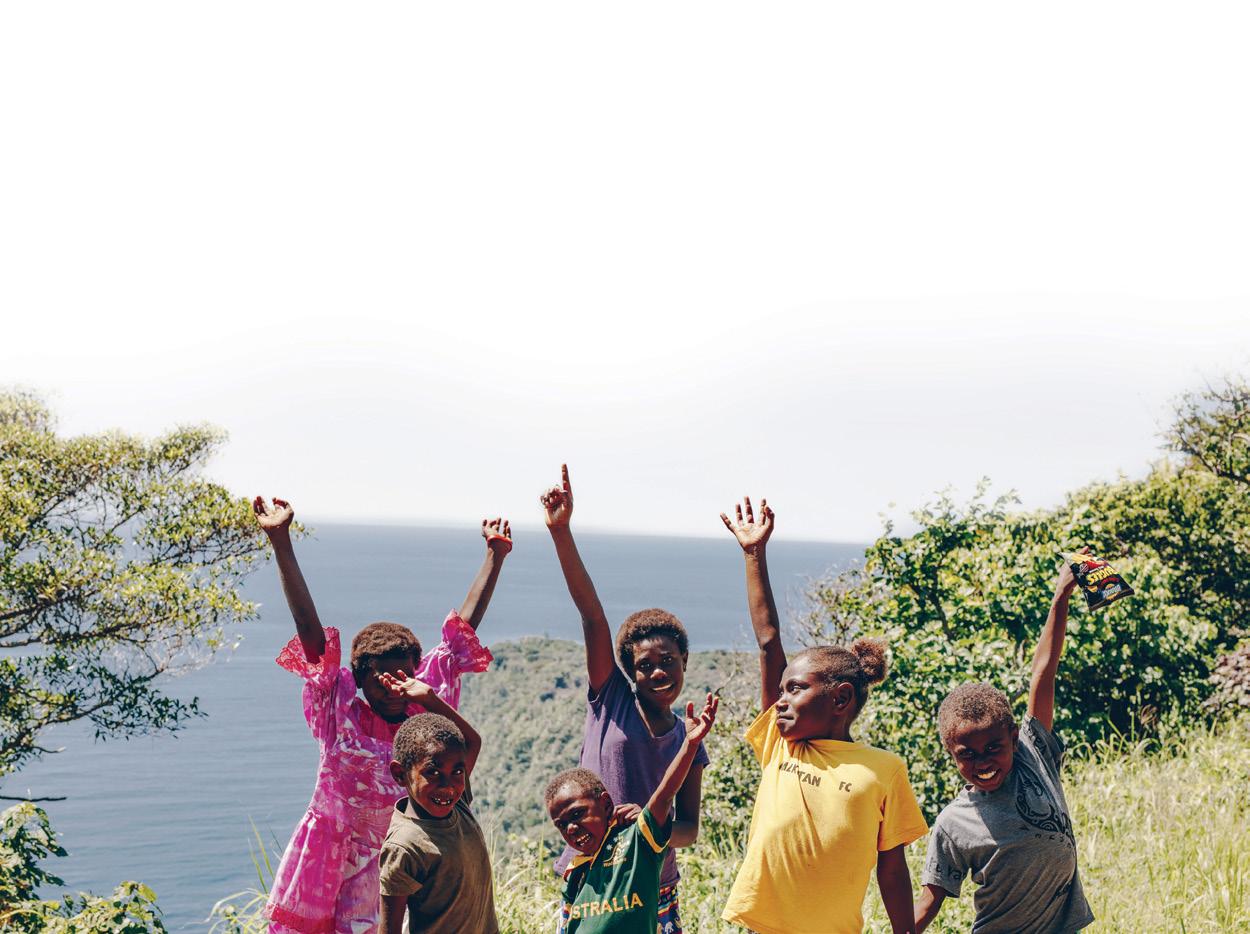





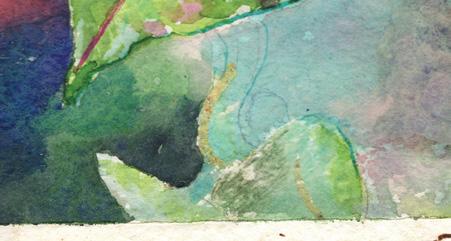









Placements finalised as at 13th January 2023
Rev Paul Turley to Scots UC (0.6) from 1 February 2023
Rev Mark Schultz to Walkerville UC from 1 January 2023
Coordinating Chaplain – St Andrew's Hospital Professional Standards Officer Placement (0.5) [Synod Office]
The following is the list of vacant (or soon to be vacant) approved placements:
PROFILES AVAILABLE
Generate Presbytery Clare UC Naracoorte UC
Presbytery of Southern SA
Christ Church Wayville UC (0.7) Glengowrie UC (0.5) (Vacant 2023) The Corner UC
Wimala Presbytery
Brougham Place UC Clayton Wesley UC Croydon Park UC (0.3) Lefevre UC (0.4) Kimba UC (0.5)
Placements Across Two Presbyteries
Yorke Peninsula Regional Mission Minister Expressions of interest to pgardner@sa.uca.org.au
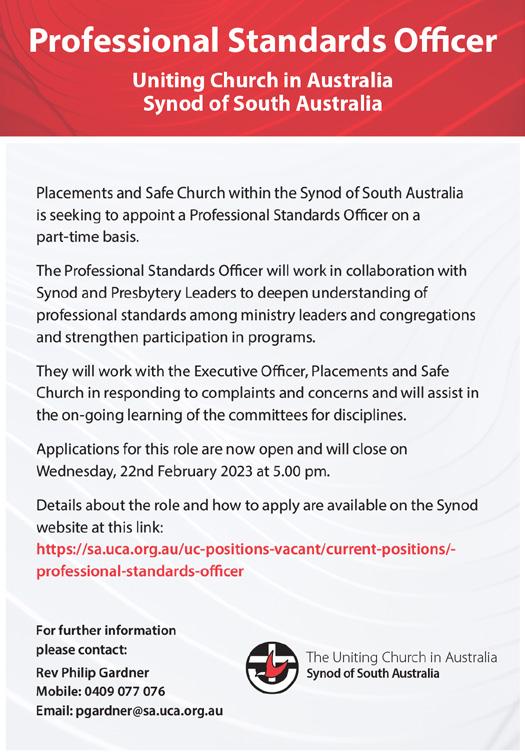
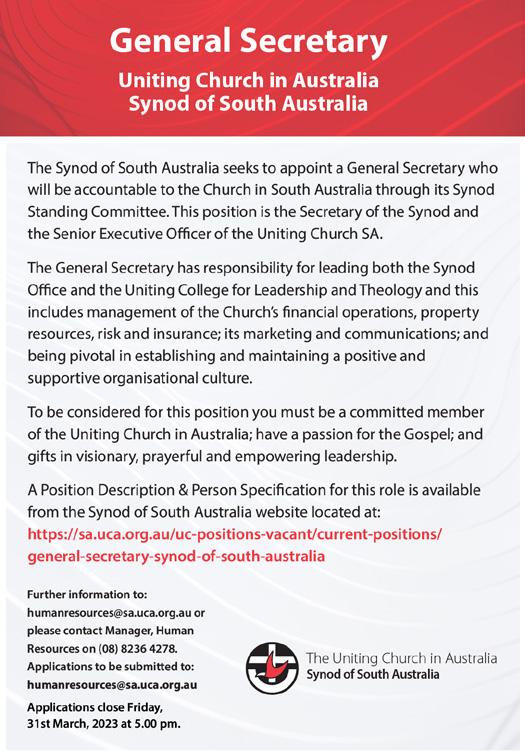




PROFILES NOT YET AVAILABLE
Generate Presbytery

Ceduna UC (0.6) Port August UC (0.5)


Presbytery of Southern SA
Church of the Trinity UC Dulwich/Rose Park United St Andrew's by the Sea UC (Glenelg) Vermont UC
Wimala Presbytery
Berri UC / Barmera UC West Lakes United
Placements Across Two Presbyteries -
For more information about placements, please visit sa.uca.org.au
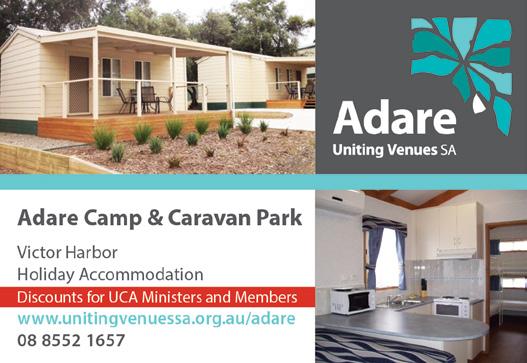
Morialta Charitable Trust Fund has been supporting disadvantaged children, young people and their families in South Australia through its annual program of distributions for 40 years. To enable the Fund to continue this support through community organisations in South Australia, Morialta Charitable Trust Fund seeks donations from the public. Donations of $2 and above are tax deductible and can be forwarded to the Morialta Charitable Trust Fund at PO Box 92, Crafers SA 5152
Deadline for the April/May 2023 edition: Friday, 10th March 2023
ISSN 0726-2612

New Times is the voice of Uniting Church in SA. Published bi-monthly, February through November, New Times represents the breadth, diversity and vision of Uniting Church members in South Australia. Articles and advertising do not necessarily reflect the views of the New Times Editorial team.

